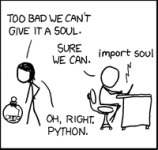ruby sparks said:
Added to which, if I think that he could not have done otherwise, then there is less reason to attach personal blame or want retribution.
If he had not been able to do otherwise in the usual sense of the words, yes. But that is not the case: Suppose the defense attorney of the serial rapist and killer says that the universe is either determinitic or it has some randomness, but either way, he could not have done otherwise, and so he is not guilty. Do you think that in the usual sense of the words, he has created reasonable doubt, so that jurors ought to acquit?
ruby sparks said:
The only caveat I would add to that is that it (free will skepticism or even disbelief) may be especially difficult for the 'western' mind, and perhaps especially the American one, for what may partly be cultural reasons.
It's just as difficult elsewhere. In other countries, they might not use the English expression 'free will', and they might not even believe in whatever is usually mistranslated as 'free will', in case of mistranslations. But they believe we act of our own accord/free will (e.g., 'por su propia voluntad' in Spanish-speaking places), and they believe in retribution. Just take a look at the history of humankind, or the present. Retribution is everywhere. And so is the distinction between people who act of their own free will, and those who do not.
ruby sparks said:
Maybe I was wrong here, in the bolded part. I was trying to avoid negative subjective moralities. It might be better or more accurate to say that he (the rapist/murderer) is a bad person, especially if we avoid subjective morality as far as possible and just say 'harmful' or 'flawed' person. Essentially, a faulty or broken machine, in terms of one that causes harm to other machines.
I do not know what you mean by "subjective morality" here, but I do know that 'bad person' does not mean 'harmful' or 'flawed'. It means a specific kind of flaw: a moral flaw. He is an evil person. An immoral person. A wicked person. And so on.
For example, an insane man who has lost touch with reality, cannot reason and goes around killing people, is surely harmful and flawed. A broken machine if you like. But he is not a bad person. He is not at fault. He is not to blame. And so on. So, the meaning of those expressions is not the same. We have different words for different sorts of broken machines. Some of those deserve punishment, and others do not.
ruby sparks said:
I am not saying that a world without retributive urges would necessarily be a better or worse place, by the way, because that's a very, very difficult question and our retributive urges (including my own) seem to be deep-seated. You might say that I tend to believe it would be a better place, I suppose, but maybe that's just wishful thinking.
I would be a world without humans, chimps, bonobos, gorillas, capuchin monkeys, etc. Retribution and morality come from millions of years of evolution.
ruby sparks said:
ETA: it's worth noting that a number of psych studies suggest that a stronger sense of or belief in free will is positively correlated with a stronger retributive urge, and a weaker belief in free will is associated with a lesser retributive urge.
I'm not saying the human system of moral retribution cannot be damaged by a belief that we cannot act of our own free will. But it almost certainly cannot be destroyed in the majority of the population by that method - studies still show retribution all around (even if somewhat diminished), and frankly short of a much more massive damage to the brain (like with a surgery), it's extremely unlikely that something so central could be taken out. I'm not even sure it can be destroyed in any human by that method.
At any rate, it is a part of the human mental machinery. If you manage to take it out, you get a broken machine.
ruby sparks said:
As a coping strategy, the illusion (if that's what it is) might be very useful indeed. Such illusions tend to be.
But why do you think we have an illusion?
I believe I act of my own accord, because the evidence is decisive. For example, I choose to move my mouse, and I do it. No one forced me. I was not compelled like a kleptomaniac, either, etc. The universe might be deterministic, but
I am not under the illusion that the universe is indeterministic. I do not know whether it is. I take no stance, but I see no reason to believe I'm not acting of my own free will, regardless of whether under the same exact circumstances, particles and all, in the whole universe, it was necessary that I would act as I did.
For that matter, I have the power to move my mouse. I can see I do it, and the evidence is decisive. Now someone might say that perhaps I don't have that power, and some powerful entity is moving the mouse when I intend to, in order to mess with my head. But that seems extremely improbable. Similarly, the free will illusion idea seems extremely improbable.


